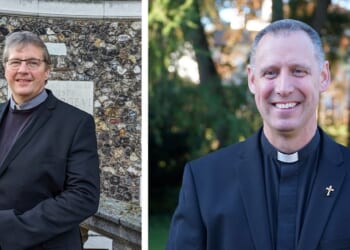Bishops’ decisions on LLF process
From the Revd Dr Clare Herbert
Madam, — I have spent my working life in ministry in the Church of England, as parish worker, deaconess, deacon, and priest. I am now in my seventies.
I can, therefore, remember, at the very start of my ministry, the cry of the late Dr Una Kroll, which she hurled from the gallery of the General Synod, when in 1978 progress towards the ordination of women to the priesthood was halted. Her cry was of rage and beseeching: “We asked for bread, and you gave us a stone.”
So, I recognised the cold, hard stone in my own heart when I read this week that the House of Bishops (News, 17 October) had decided that there should be no immediate change to the current rules that bar the clergy from being in same-sex civil marriages. It is that stone in the pit of the stomach which is formed by the pain of knowing that a cry for equality has gone unheard.
On 31 May, I married my partner of 35 years. Surrounded by joyful witnesses to our enduring love, my partner became my wife in a Quaker marriage ceremony. In retirement, I have become a “Quanglican”: that is, one who gladly attends Anglican services and Quaker meetings for worship. My wife is a Quaker, and, in the Religious Society of Friends, I have experienced a profound sense of freedom, affirmation, and openness such as I have never known before.
My personhood and closest relationship were celebrated that day in a fullness to which I continue to respond with gratitude, joy, love, and the desire to continue serving the God who made me.
We in the lesbian and gay community may choose to pick up and live with the heavy, joyless stones imposed on our heads and hearts by an unresponsive Church. But it is important to recognise that we do not have to do so in obedience to God. I have discovered the God who is a Giver of Bread.
CLARE HERBERT
15 Queen Street, Emsworth
Hampshire PO10 7BJ
From Canon Roger Arguile
Madam, — I wonder whether the General Synod will consider separating the two issues of same-sex blessings and same-sex marriage. The first certainly raises major theological issues, and, even if the principle is acceded to, the precise terms will be controverted, but the issue of marriage is of a different order altogether.
Civil partnerships are an invention of statute; marriage has been recognised by both Church and State for centuries. None of the marriage liturgies of the Church can in any way encompass the idea of a union of those who cannot procreate; the relationship of those of the same sex is of a different order. I know that couples can adopt, but that is not the same thing at all.
To deal with the two issues as if they were parts of one another is, in my view, a serious mistake.
R. H. W. ARGUILE
10 Marsh Lane
Wells-next-the-Sea,
Norfolk NR23 1EG
From Pat Goldsmith
Madam, — The Bishop of St Edmundsbury & Ipswich, Dr Joanne Grenfell, we read, said that the Bishops had felt that the price of further changes was too high, regarding their support for same-sex marriages (News online, 17 October). When did the unity of the Church come before doing what is right?
Sunday by Sunday, we break bread in the eucharist, letting love break through into our lives. Yet, each week, the fractured body of Christ is re-membered.
The moral cowardice of our bishops in their desperation to prevent schism shows a lack of trust not only in the Church, but also in the power of resurrection.
PAT GOLDSMITH
41 Matford Mews
Exeter EX2 8XP
Will the graffiti questions be properly addressed?
From the Revd Professor Paul Avis
Madam, — Like others, I was arrested by the report of graffiti in Canterbury Cathedral (News, 17 October) and stimulated by Andrew Brown’s “Viewpoint” (Comment, same issue). I am not making any judgement here on the integrity (or not) of the cathedral’s elaborate process of arriving at the graffiti to be displayed or the wisdom (or not) of doing so. I wish to make one main point.
Some of the questions that are posed reflect the perennial cries of the human heart and have strong biblical resonances, e.g., “Why do the wicked prosper?” (Jeremiah 12.1; Job 12.6; various Psalms). Even Christians, as well as non-Christians, ask, “Why has this happened to me?” and “Why does God allow the innocent to suffer?” Such questions are not confined to “minority” groups: we can all identify with them. If we did not wrestle with them, even as people of faith, we would not be human; nor would we be like Jesus himself (e.g., in Gethsemane).
There is no reason that such cries should not be flagged up somehow in a cathedral — provided the clergy expect to try to respond to them from scripture and theology — but how they are displayed is a matter of judgement. I detect a disturbing disconnect between the discussions of the “minority” focus groups and the supposedly resulting graffiti: the people in those groups cannot be the same sort of people who daub graffiti on subway walls. That genre has been chosen for impact, for sensation.
I was deeply shocked to see the graffito that asked of God, “Why did you create hate?” This question is of a different order from the others, because hate is an expression or manifestation of evil, of an evil will or intent, and this therefore implies the blasphemous notion that God is the author of evil because God has created it.
The Christian theological tradition has offered several partial answers to the problem of evil. But, if there is one truth that is indisputable and completely non-negotiable in the Christian faith, it is that, while God seems to permit suffering and wicked deeds for reasons that we do not fully understand, God is not and cannot be the author, cause, or creator of them. “God saw all that he had made and, indeed, it was very good” (Genesis 1.31). Our faith does not allow us to impute evil intent to God; for “God is light, in whom there is no darkness at all” (1 John 1.5). Hatred belongs with the darkness.
But the cathedral may reply, “If that’s a question that someone is genuinely asking, we should showcase it.” But that (hypothetical) response would be to ignore an overriding fact about the cathedral: it is the liturgical seat of the Archbishop of Canterbury’s teaching and preaching ministry. By giving hospitality to the intolerable implication in “Why did you create hate?”, the cathedral is unintentionally undermining that ministry. An uninstructed visitor, gazing at the graffiti, could be forgiven for assuming that the Church believes that it is acceptable to entertain that notion, or even that the cathedral is actively sponsoring or endorsing it. Any seed of faith could be destroyed there and then. One of Christ’s “little ones” could be caused to stumble (Matthew 18.6).
It is claimed as a virtue of authenticity that the graffiti are “unfiltered”, but one can easily think of other potential graffiti, concerning certain minorities, that would never have been posted. Oversight is always needed. Finally, I did not find, on the cathedral web pages, any information about how the cathedral clergy would be responding to the acceptable questions posed — e.g., with a series of sermons linked to open discussion groups, together with pastoral help in the cathedral newsletter and on the website for troubled enquirers. Are these acute existential questions to be left hanging in the air, unanswered?
PAUL AVIS
Lea Hill, Membury, Axminster
Devon EX13 7AQ
Black clergy who served in the C of E in the past
From Professor David Killingray,
Madam, — It is always encouraging to read of clergy of African origin and descent in the history of the C of E (Features, 17 October). As far as is known, the first ordained African was Philip Quaque in 1765, whose ministry was spent on the coast of West Africa. I know of 13 Black clergy who worked in English and Welsh parishes during “Victoria’s reign”, the most notable being Bryan Mackey, whose ministry of nearly 50 years was in the Gloucestershire parish of Coates until 1847 (see Kathleen Chater’s recent article in the Journal of Ecclesiastical History, 2025).
Another cleric in a Yorkshire parish was the Revd Ebenezer Robertson, at St Margaret’s, Beverley, in the 1830s. The Society for the Propagation of the Gospel sponsored Quaque, and, through the 1890s, the Society employed three Black clergy for deputation work in English parishes, notably the Revd Henry Mason Joseph, who eventually fell afoul of the unsympathetic reforming hand of Bishop Montgomery. For the years 1900-50, I have records of 12 Black clergy drawn from all parts of the Black Atlantic world, serving in English parishes usually as curates, plus a number of “also-rans” who join the list of those since Olaudah Equiano in the 1780s to be rejected for, or who retreated from, Anglican ministry.
Edward Cragg Haynes was generous with his “own” money within his Swinefleet parish, although the origin of that wealth enabling him to be educated as an English gentleman, along with the £15,000 later inherited from his father, was gained by his family’s earlier exploitation of enslaved fellow Black people in Barbados (see the UCL “Legacies of Slavery” website). It is mystifying to see reference to Haynes’s theological education in Southwark “cathedral” and “diocese”, created after his death.
I would be pleased to receive further details of pre-Windrush Black clergy working in Britain.
DAVID KILLINGRAY
72 Bradbourne Road, Sevenoaks
Kent TN13 3QA
From Mr James Ashdown
Madam, — How interesting to read the feature about E. C. Haynes. We, in the Golden Cap Benefice in Salisbury diocese, are also celebrating a Barbadian priest on the bicentenary of his birth this year. Our man is Thomas Law Montefiore, who was a priest in Wootton Fitzpaine, Catherston Leweston, and Chideock, between 1858 and 1890. He was a scholar (he wrote a commentary on the Greek text of Matthew), rural dean, and diocesan inspector of schools; he had 13 children and, it is thought, was an ancestor of Hugh Montefiore.
The biggest surprise from my research was to discover his complex ancestry. He certainly was part of the wealthy and influential Jewish Montefiore family, but it also seems that his grandmother was of black African ancestry and quite probably a slave. This, however, has been discovered only recently through research in Barbados.
We will have a service commemorating Montefiore in St Mary’s, Catherston Leweston (where he was Rector most of his ministry) on 26 October at 9.30 a.m., and then I will be giving a lecture on 31 October at 7 p.m. in Charmouth village hall.
JAMES ASHDOWN
Meadow Lodge
Wootton Fitzpaine
Dorset DT6 6NF
Use of left and right brain in church leadership
From the Revd Dr Jonathan Kimber
Madam, — I am very grateful to Dr Eve Poole for her recent review of my book, Fullness of Vision, Fullness of Life (Books, 17 October), not least for her strong underlining of the significance of the work of the contemporary polymath Dr Iain McGilchrist, whose perspective my book seeks to summarise and apply.
A main axis of Dr McGilchrist’s work is the question why it is that our brains are substantially divided into two hemispheres. Dr McGilchrist notes that many of those he addresses tend to want one of two narratives: either one hemisphere is good and the other bad, or they exist in a balanced and symmetrical relationship. The richness and relevance of Dr McGilchrist’s work stems in large part from how his research and understanding moves beyond either of these overly simple perspectives.
Dr Poole’s review does highlight that “the magic” lies in the interplay between the hemispheres. Her language of clear-cut left-hemisphere analysis versus a holistic right-hemisphere approach might be misread as implying a concern to establish which of the two hemispheres is the good one. Dr McGilchrist is clear that we need the best contributions of both hemispheres, and plenty of them.
Thus, I go to considerable lengths not to portray what I term the Church Strategic Leadership Discourse, with its undeniable clear-cut left-hemisphere strengths, as a “bogeyman” (Dr Poole’s word): for instance, I devote a section to describing how its proposals can be used well. This is, as one would expect, coupled with analysis of how other aspects can become counter-productive.
The contrasting gifts of the clear-cut and the holistic can be in tension. Fullness of life is best served by a wise, dynamic, and constructive harnessing of that tension. My aim has been to offer a perspective and a mode of conversation that moves beyond polarisation. I hope, therefore, that my book will be of interest not only to those groups that Dr Poole mentions, but also to many who find persuasive the Church Strategic Leadership Discourse.
JONATHAN KIMBER
King’s College
Cambridge CB2 1ST
Conduct of the Gaza War and hatred of Jews
From the Revd Dr Ian Paul
Madam, — Professor Dan Cohn-Sherbok (Comment, 17 October) is mistaken when he claims that the current form of antisemitism is “something new”. In the Middle Ages, hatred of Jews was motivated by believing that they were immoral, and not just outsiders, based on the blood libels that are not so different from the accusations made today.
He describes as “horrific” the conduct of the war by Israel — a war that, experts point out, has had the lowest civilian-to-combatant ratio of any modern urban war, and certainly far lower than recent wars conducted by the United States and the UK. The horror has primarily arisen because of the uncritical circulation of Hamas propaganda.
Professor Cohn-Sherbock then calls for Israel to make “sacrifices” for the Palestinians to have their own state. He omits to mention the sacrifice of Jewish communities in the 19th century in Palestine at the hands of local Arabs, the sacrifices of a nation faced with three wars of annihilation in 1947, 1967, and 1973, and the sacrifices of the 900,000 Jews driven from their ancient homes across the Middle East by Arab persecution and pogroms.
He also omits to mention all the opportunities for a Palestinian state, in 1947, in 1993, and in 2008 — when the current leader of Fatah, Mahmoud Abbas, simply refused to discuss the proposal of Ehud Olmert. In the 20 years from 1947 to 1967, why did Jordan and Egypt not establish a Palestinian state in Gaza and the West Bank, if that is the aim?
Tragically, we will not tackle the rise of antisemitism as long as we tell only half the story.
IAN PAUL
102 Cator Lane, Chilwell
Nottingham NG9 4BB
The divinity of Christ in the New Testament
From the Revd Paul Burr
Madam, — The claim that the statement “Jesus is God” is not found in the New Testament is arresting but preposterous (Letter, 17 October). The whole purpose of the New Testament is to proclaim that “Jesus is the Lord” — the name of the God of Israel, as any reader of the Old Testament will know.
To believe and confess Jesus as Lord has been definitive for Christian identity and membership of the Church from the beginning. To this day, you cannot be baptised or confirmed or receive holy communion without the affirmation that Jesus is the Lord, expressly meaning that Jesus is God — the plain meaning of the creeds — and the meaning of calling Jesus “Lord” in every book (and on almost every page) of the New Testament.
PAUL BURR
The Vicarage, The Common
Swardeston, Norwich NR14 8EB
The Editor reserves the right to edit letters

















